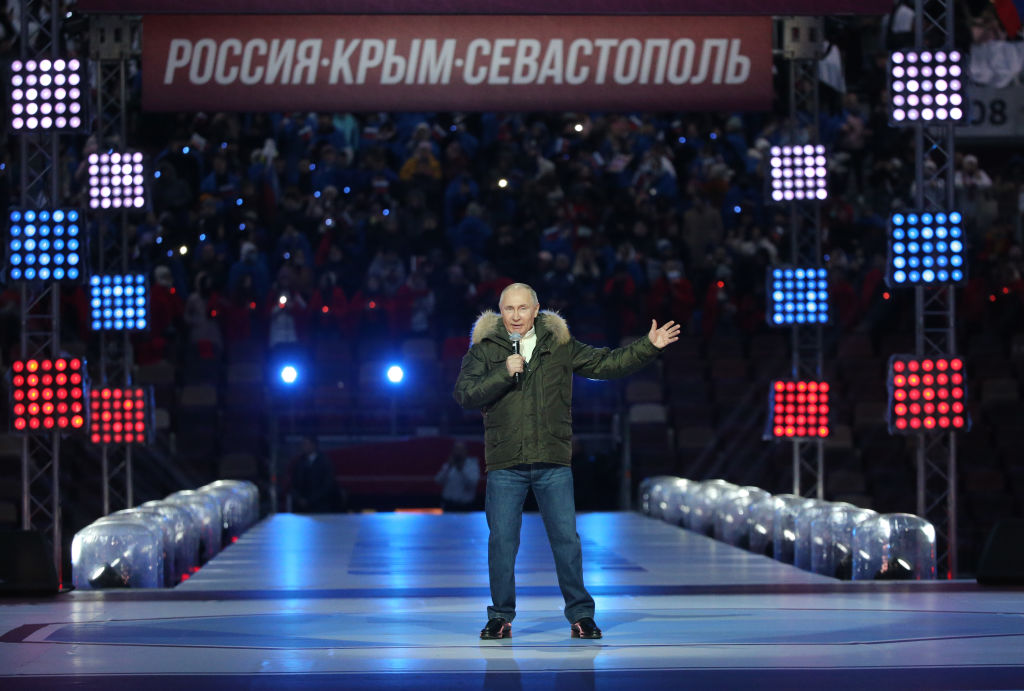
Russian President Vladimir Putin’s recent annual address on the state of his country was so ostentatiously threatening as to sound reassuring. Not only did he forbid the West from crossing red lines, but he announced that he himself would determine where those lines are. He didn’t specify whether he would inform anyone else—as if it had always been the Creator, not politicians, marking red lines in the past.
He seemingly played chicken with himself—certainly not with the chronically listless West. Few will believe Putin when he suggests that Russia is threatened by the might of the European Union, which can’t even deal with Hungary. The same goes even for the United States. Though President Joe Biden’s administration has just imposed new sanctions on Russia, they appear to be even more symbolic than those levied by Donald Trump—the president elected with Russian help. With the new sanctions, the Russian ruble depreciated for two days but then rose strongly in value.
Not even Russians will find Putin’s threats compelling. That doesn’t mean they will rush to depose him (such moves have always meant trouble, usually resulting in an even worse regime). But there’s little indication that Russians will respond as they did after the annexation of Crimea, when Putin’s popularity shot up.
After all, Russia’s theft of Crimea and eastern Ukraine’s Donbas region hasn’t benefited Russia or its people. After seizing and devastating 7% of Ukraine’s territory, the Kremlin now must maintain those territorial gains by financing mercenaries, building additional infrastructure (like the giant bridge from the Russian mainland to Crimea), and paying benefits to local residents unable to live and work normally.
Moreover, Russia has lost—possibly forever—the goodwill it once enjoyed in Ukrainian society, which historically functioned within the Russian cultural sphere. (The same kind of cultural ‘divorce’ is also now underway in Belarus.) Ukrainians watched Russian TV, listened to Russian music and bought Russian consumer goods; hardly anyone—at least east of Kyiv—was excited about Ukrainian identity. But that has all changed. No Ukrainian politician has done as much as Putin to unite Ukrainians around the idea of Ukrainian nationhood.
Russia’s aggression has also led Ukraine to expand and consolidate its army; pursue deeper cultural, economic and political integration with the West; and enact domestic reforms, albeit sluggishly. Putin has even managed to turn pro-Russian politicians like Ukrainian President Volodymyr Zelensky into heroes of the fight for independence from Russia.
The Russian leader’s next achievement most likely will come in the form of improved polling numbers for Zelensky’s flagging political party, followed by his re-election. With the pro-Russian Opposition Platform—For Life party currently leading in opinion polls, this outcome seemed uncertain until recently. But Putin, that miracle worker, has all but ensured that Russian-aligned forces will lose support.
Elsewhere, Putin’s expanding list of achievements includes ruining political and economic relations with the Czech Republic, which recently expelled 60 Russian diplomats. Before revelations that the Kremlin was behind an explosion at a Czech ammunition depot in 2014 that killed two people, the country’s president, Milos Zeman, was perhaps the most pro-Putin politician in Europe, and Prime Minister Andrej Babis previously opposed extending EU sanctions against Russia. The Czech Republic has now excluded Rosatom, Russia’s state nuclear energy corporation, from its public procurement tenders, too. And, following his latest round of bluster, Putin can forget about distributing the Russian-made Sputnik V Covid-19 vaccine widely in the EU.
Likewise, the Nord Stream 2 pipeline to deliver Russian natural gas to Germany via the Baltic Sea is now hanging by a thread. If the project isn’t completed by the time of Germany’s federal election in September, it could become a mere tourist attraction for divers. The German Greens are currently leading in the polls, and both the German press and German society want the project scrapped. Even if the pipeline were to be completed, as Maxim Samorukov of the Carnegie Moscow Center notes, it’s hard to believe that it would be fully used, given that its original purpose (for Russia) was to exclude Ukraine.
Though we don’t know the exact costs of Russia’s recent deployment of almost 150,000 soldiers, heavy equipment and field hospitals to the Ukrainian border, there’s no doubt that it came at considerable expense to an economy that’s about the same size as that of New York. Russians are acutely aware of these costs. After experiencing 10 years of falling real wages, few are still moved by Putin’s fresh bursts of sabre-rattling.
It didn’t have to be this way. Putin’s Russia could have chosen modernisation rather than murder. Putin’s political lodestar, the Soviet Union, also chose the latter path, and Russia today increasingly resembles nothing so much as the late USSR, ruled at the time by a different KGB man, Yuri Andropov. Russia has achieved exactly as much in Ukraine as the USSR achieved in its 1979–1989 war in Afghanistan.
Now, Russia’s defence minister, Sergei Shoigu, has announced that Russia will start withdrawing its forces from the Ukrainian border region. Apparently, Putin’s speech really was all sound and fury, signifying that he is losing influence both inside and outside the country.

